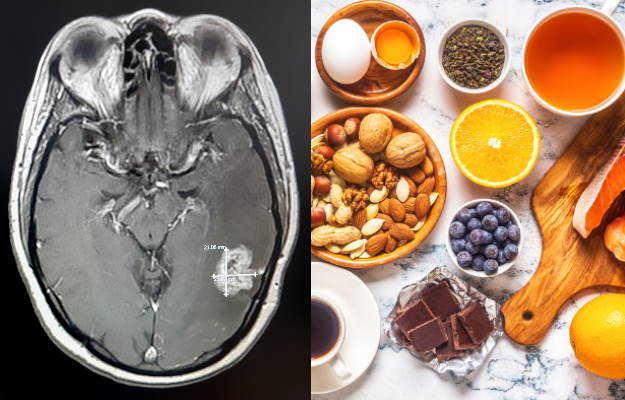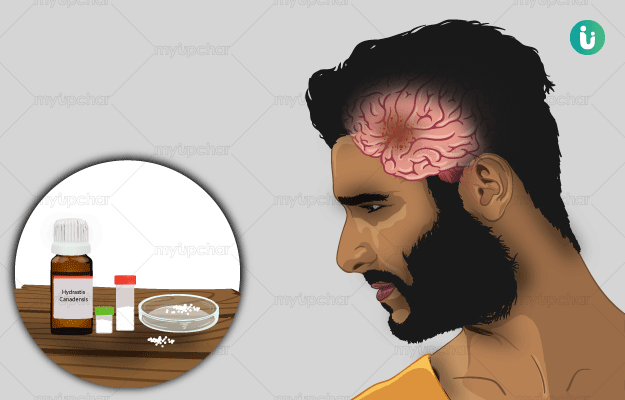A brain tumour is a mass or growth of abnormal cells in the brain. Some brain tumours are benign while others can be cancerous. Brain tumours can begin in your brain or cancer can begin in other parts of your body and then spread to your brain.
(Read more: Brain cancer symptoms)
The symptoms of this disease may vary depending on where the tumour is located and how big it is. When a tumour is big enough to put pressure on the rest of the brain tissue, a person starts to notice few symptoms such as headaches, fatigue, blurred vision, vomiting, dizziness, memory loss, loss of bowel control or loss of bladder control, and changes in taste and smell.
However, the tumour itself, its medications and other treatment can all cause symptoms that make eating and drinking a challenge. As a result, the patient's diet may need to be modified to meet their nutritional needs. In this article, we will discuss the foods that should be eaten and avoided for recovery, and to control the symptoms. We've also shared an easy to follow Indian diet chart for brain tumour patients.
(Read more: Cancer diet)
- Brain tumour diet to control symptoms
- Food for recovery in brain tumor
- Indian diet plan for brain tumor patients
Brain tumour diet to control symptoms
A brain tumour patient may experience different symptoms due to the medication or other treatment they are taking. Diet can play a role in managing them. Here's a guide to do just that:
Fatigue
Fatigue is one of the common symptoms of this disease, which can make it tough for the patient to manage the disease by themselves. If you do not have a caretaker, try to make managing food a little easier for yourself. You can do this by preparing a menu in advance, doing the preparation ahead of time, and whenever you feel good, try cooking in bulk so that you have food for a while. Alternatively, you can have healthy ready-to-eat homemade snacks such as energy bar, laddu, dried fruits, seeds trail mix, peanut brittle (chikki/ gajjak), etc. You should ask your nutritionist about nutritional shakes. These can be the easiest way to address your nutritional requirements if you're suffering from severe fatigue.
Vomiting
Eating right is important to avoid nausea and vomiting during this disease. Try to take small, light and frequent meals. Ginger or peppermint tea may help resolve symptoms. Eat simple foods such as rice, scrambled eggs, toast, bananas, mashed potatoes, and custard to keep nausea and vomiting at bay. Allow plenty of fresh air in the house and try to disperse the cooking odours. Avoid taking cream soups, fatty/fried foods, desserts, and avoid lying down immediately after eating as all this can trigger vomiting.
(Read more: How to stop nausea and vomiting)
Constipation
Fibre-rich foods help with constipation, which is very common during this problem. Always try to add seasonal and fresh fruits and vegetables to your diet. Millets should be an essential part of your diet. You can have finger millet, pearl millet, sorghum instead of plain wheat flour. To help have a good bowel movement, you can have 1 teaspoon of psyllium husk with 1 glass of warm milk at bedtime.
Dehydration
Due to medications and other treatment, dehydration is commonly seen in brain tumour patients. Adequate fluid intake is, therefore essential. You can have coconut water, fruit juices, or buttermilk as they are easy to digest and are loaded with electrolytes and vital nutrients. Otherwise, try to drink 10-12 glasses of water daily.
(Read more: How much water to drink in a day)
Taste changes
Some people experience a complete loss of taste, while others report unpleasant tastes such as a bitter or metallic taste. Yet others have reported increased sensitivity to certain flavours, such as finding sweet foods intensely sweet. If you’re finding sweet foods overwhelming, try sticking to savoury snacks like chips, salted nuts, or cheese and crackers. Similarly, if you're finding salty foods unpleasant, add more sweet foods to your diet.
Memory loss
Memory loss is a common symptom of a brain tumour. There is evidence showing that adding a few nutrients in your diet - such as omega 3 fatty acids, vitamin K, lutein, folate, beta carotene and flavonoid - can be helpful. To add these nutrients to your diet, take walnuts, flax seeds, green leafy vegetables, red and yellow fruits and vegetables, and dark chocolate regularly.
(Read more: How to improve your memory)
Food for recovery in brain tumor
Diet is one of the best ways to aid in the recovery of brain tumour patients. Here are some dietary interventions you can follow in addition to the treatment:
Keeping up your strength and energy
A brain tumour patient can suffer from decreased appetite due to the treatment. However, it is vital to maintain strength and keep energy levels high to fight infections. To do this, add apple puree, paneer, mashed vegetables, nutritional supplements, or homemade milkshakes, smoothies, and cooked cereals to your diet. Maximize the foods that you need to maintain your strength. The goal is to maintain a healthy weight.
Foods to avoid nutritional deficiencies
You should have a balanced diet so that you can get all the nutrients you need. Add a variety of colourful fruits, vegetables, grains, lentils, lean meat, and other healthy foods. Your plate should have all the colours of the rainbow! This will help you get the greatest amount of nutrients and antioxidants to avoid different types of nutritional deficiencies.
(Read more: Nutritional deficiency symptoms)
Foods for lowering the risk of infection
Antioxidants can help your body fight against infection. Your diet should provide you with adequate amounts of vitamin A, vitamin C, vitamin D, vitamin E, zinc, and selenium. To add these nutrients to your diet, you can have these food items:
- Vitamin A: carrot, pumpkin, sweet potatoes, papaya, kiwi
- Vitamin C: mangoes, broccoli, pineapple, tomatoes, bell peppers, cauliflower, Indian gooseberry (amla), lemon, orange
- Vitamin D: fatty fish, cod liver oil, egg yolks, mushrooms, vitamin D fortified foods such as milk and curd (Read more: Vitamin D rich foods)
- Vitamin E: wheat germ oil, sunflower seeds, almonds, peanut, beet greens, red bell pepper
- Zinc: lentils, beans, hemp seed, tofu, oysters, whole grain (Read more: Zinc rich foods)
- Selenium: brown rice, sunflower, paneer, mushroom, spinach, cashew nuts, banana, fish, chicken
Foods if you are taking steroids
If you’ve been taking steroids for a long period, it‘s important to look after your bone health. Make sure you have plenty of calcium-rich foods. Milk, yoghurt, and finger millet are good sources of calcium. If you’re choosing dairy products, remember to choose those with calcium fortification. Ask your doctor if you should be taking a vitamin D supplement.
Indian diet plan for brain tumor patients
Here is a sample diet plan for brain tumor patients that takes into account all the information given above. You can follow this diet plan under the guidance of a nutritionist or discuss a customized meal plan for yourself.
- Early morning: milk (1 cup) + soaked almond (8) + walnut (2-3)
- Breakfast: idli (2) + sambhar (1-2 bowl)
- Mid meal: fruit salad (1 bowl) + roasted seeds (1 tablespoon)
- Lunch: palak khichdi (1-2 bowl) + curd (1 bowl) / fish curry (1-2 pieces)
- Evening tea: milkshake (1 glass) / grilled paneer (5-7 pieces)
- Dinner: porridge/ khichdi (1-2 bowl) + kadhi (1 bowl)
- Bedtime: turmeric milk (1 glass)
Find Nutritionist in cities
Doctors for Brain tumour diet: food to eat and avoid

Dr. Dhanamjaya D
Nutritionist
16 Years of Experience

Dt. Surbhi Upadhyay
Nutritionist
3 Years of Experience

Dt. Manjari Purwar
Nutritionist
11 Years of Experience

Dt. Akanksha Mishra
Nutritionist
8 Years of Experience
References
- American Brain Tumor Association [Internet]
- Huang T L, et al. Benefits of fatty fish on dementia risk are stronger for those without APOE epsilon4. Neurology. 2005 Nov 8; 65(9): 1409-14. PMID: 16275829
- Derbyshire Emma. Brain Health across the Lifespan: A Systematic Review on the Role of Omega-3 Fatty Acid Supplements. Nutrients. 2018 Aug; 10(8): 1094. PMID: 30111738











